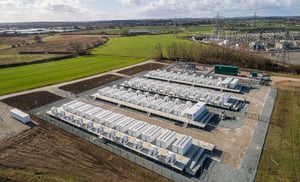Centrica plc (LON:CNA) today announced a package of actions and proposed measures to reform the UK energy market and benefit customers. This will increase engagement and choice, result in better deals and reduce average bills, deliver a fairer allocation of energy policy costs, and further protect vulnerable customers. As market leader, we are announcing seven unilateral steps we will take, and proposing a further seven recommended actions for Ofgem and the Government, designed to improve the market further.
We believe our proposals will deliver a fairer, more competitive and sustainable energy market for customers and will be significantly more effective than further Government intervention through temporary price controls.
Iain Conn, Group Chief Executive, Centrica plc said: “We fully recognise that the energy market can and should be improved, but further price controls will only set this back. We believe more action is needed and are ready to play a leading role. Today we have set out the unilateral actions we will take to improve the UK energy market for our customers. This starts with the withdrawal of the Standard Variable Tariff which contributes to lower levels of customer engagement.
We also believe that further measures by Ofgem and the Government are required so that together we can create a market that works for everyone, where there is improved transparency and a fairer allocation of costs currently included in the energy bill.
We have long advocated that the end of the Standard Variable Tariff is the best way to encourage customers to shop around for the best energy deal. But we also need a fairer way to pay for the changing energy system by removing Government policy costs from energy bills. This will be fairer for everyone and especially those who struggle most with their bills.
Politicians, regulators and energy companies acting together can do better than simply imposing a temporary cap or freezing household energy bills. Working in partnership, we can create a fairer, more competitive energy market for the long-term. We ask that the Government and Ofgem engage with us and other members of the industry to evaluate these proposals in the period up to March 2018.”
Our own actions and other proposals build on the findings of the Competition & Markets Authority (CMA), which noted in its final report into the energy market that the key issue was one of customer engagement and that a cap on all default tariffs would “run excessive risks of undermining the competitive process, likely resulting in worse outcomes for customers in the long run”. We believe the competitive market established to date can be harnessed and further improved for the good of all market participants, instead of Government price controls which will only perpetuate the problems of the current market.
Centrica has already taken a number of measures over the last 12 months, including investments to improve customer service, proactively engaging 5 million customers on the standard variable tariff to make them aware of their energy choices, reducing our own costs to enable cheaper offers, and introducing British Gas Rewards, a new scheme to reward loyalty. We continue to invest significantly in technologies and propositions for the energy system of tomorrow which save customers time, money and hassle – such as the Hive product range – and which provide insight, optimisation and distributed energy solutions for business customers.
The energy sector delivers a significant contribution to the UK economy, adding £27 billion to GDP every year. The sector invested £11.9 billion in 2016 alone and the Government has identified a pipeline of future projects worth over £200 billion in the years ahead. Energy is a key input to all economic activity, is an important driver of the UK’s productivity and therefore getting energy right is fundamental to the Government’s Industrial Strategy. We welcome the Government’s recognition of the sector’s contribution to the economy and look forward to the publication of the forthcoming Industrial Strategy White Paper.
Today Centrica sets out the seven actions we will take unilaterally to further improve the UK energy market and deliver more customer engagement, increased choice and better deals for our customers. These actions will all be implemented no later than 31 March 2018.
We will:
· Unilaterally withdraw the Standard Variable Tariff (SVT) for new customers, aimed at increasing customer engagement: We believe that one of the main problems with the market is the ongoing nature (“evergreen”, without an end date) of the SVT; so, British Gas will unilaterally withdraw the SVT and instead offer customers a choice of fixed term competitive tariffs. This follows Ofgem’s recent changes permitting fixed term default tariffs. Encouraging customers regularly to select a new energy deal when their fixed contract ends will drive greater choice and competition. This will result in a broader range of better deals with fewer people on default tariffs. And if SVTs could be ended completely then the effects would be market-wide.
· Provide new offers to respond to customers’ changing needs: We are introducing a number of new offers to meet our customers’ requirements for value, convenience and choice. We have recently introduced an on-line only tariff, as well as bundled offers for energy and boiler servicing and energy and HIVE connected home products. This will give our customers more choice to choose a tariff which works for them. We will also reward loyalty through British Gas Rewards which now has over 500,000 members.
· Proactively offer customers a choice of fixed term tariffs at the end of their contract: We will offer a range of fixed term tariffs with a duration of up to three years. We aim to minimise the number of customers who go onto “default tariffs” by offering customers at least two alternative tariffs when their current deal ends.
· Introduce a new fixed term default tariff: For any customer who does not make an active decision when their tariff ends, we will introduce a 12-month emergency or default tariff with no exit fees.
· Engage customers on legacy Standard Variable Tariffs and offer them better deals: We are keen to move all our customers off the SVT. We will contact all of our customers at least twice a year to encourage them to move away from the SVT. We have already made good progress having contacted all British Gas SVT customers in the first half of 2017, with 10% switching away from the SVT. For as long as customers remain on legacy SVTs we will ensure they continue to be priced competitively. We will publish the number of SVT and default customers we supply twice a year alongside our financial results.
· Introduce simple no nonsense bills for all our customers: We will work with Ofgem to secure the permissions necessary to introduce much simpler bills as fast as possible for all our customers which will help them to make the right choice about their energy tariff.
· Drive further improvements in customer service and in our own efficiency: We are committed to significant improvements in customer service and to drive competitiveness through reducing our overall cost base. Our goal is to deliver great customer outcomes, remain highly competitive and deliver sustainable returns. Relative to 2015, in 2017 our complaints in UK Home are on track to be around 40% lower and we will have delivered over £600m of annual cost efficiencies across the Group. We will continue to drive material further improvements in our own cost efficiency.
However, to reinforce competition and choice, and deliver a sustainable and fairer energy market for customers our own actions need to be supported by action from Ofgem and the Government. We ask them to take the following seven further actions to address some obvious failures and distortions in the market.
· Phase out the SVT altogether and prohibit all tariffs without an end-date: Through changes to the licence conditions, Ofgem should prohibit tariffs without an end-date and force a market-wide phase-out of the SVT over a defined period. The “evergreen” nature of the standard variable tariff acts as a disincentive to customer engagement. Eliminating tariffs without an end-date will encourage all customers to make a regular choice about which energy supplier and product is best for them.
· To be fair to all customers, level the playing field on Government social and environmental policy costs: The market is now mature and highly competitive with over 60 suppliers. If social and environmental policy costs are to remain on the bill, the playing field should be levelled so that all domestic energy suppliers are obliged to contribute to the social and environmental policy costs including the “Warm Home Discount” and the “Energy Company Obligation”. Currently this is not the case, and as a result some customers are being made to pay more for these costs, whilst others are exempt. This is driving price distortions in the energy market and also creating advantages for some suppliers to undercut others.
· Move funding of all energy policy costs from bills to a less regressive mechanism such as general taxation: The energy system must change, and it is not cheap. These costs should be paid for more fairly with a greater burden carried by those who can most afford it. Recent investigations and reviews have identified the extent of significant and rising government energy policy costs which are currently paid for through energy bills. While we recognise it would not be easy, we believe the Government should consider a less regressive mechanism to recoup policy costs, to protect those on the lowest incomes for whom energy is a higher proportion of their outgoings. The current system of collecting energy policy costs via energy bills is not means-tested and is regressive. We estimate that over £5 billion annually could be removed from energy bills, equivalent to around £200 on the average bill. Clearly society would still have to pay for these costs another way such as through taxation, but it would be much fairer and protect the vulnerable and those who can least afford it.
· Make the smart meter rollout more efficient and avoid price controls derailing it: British Gas is leading the way in the smart meter rollout and has installed over 4.5 million smart meters in UK homes to date, equivalent to all other suppliers combined. Differing rates of installation leads to costs of the programme being borne by customers unevenly and unfairly. We support the digitisation of energy through smart meters, which help our customers save energy and bring the benefits from eliminating estimated bills. However it is expensive during the roll-out period. Our smart meter costs are rising to approximately £300 million a year, equivalent to around £40 on the bill for each of our customers. The Government should address inefficiencies in the programme, for example taking a more flexible approach to rapidly-changing technology, reviewing the “opt-in” nature of the programme design and the 2020 deadline which incentivises companies to hold back, hoping to acquire customers with meters at the end of the period rather than install their own. Additionally, any Government imposed price control needs to be thoughtfully constructed to allow energy suppliers to make the investment required, and not to disadvantage companies who are paying for the investment. There is a real danger that a price control will derail the smart meter rollout and lead to companies implementing the programme more slowly.
· More consistency for vulnerable customers: We agree that customers who are vulnerable, disadvantaged and unable to participate fully in what is already a highly competitive market should be protected. Many other suppliers do not provide the sort of help that we do for those who need it. We believe that supporting truly vulnerable customers is not an optional extra. It is a moral, social and commercial obligation. Energy suppliers should not be able to opt out. All suppliers must demonstrate that they can serve those who are most in need, with no exemptions. In fact, this is part of every supplier’s operating licence conditions and it should be consistently enforced. In addition, there are unclear and often contradictory definitions of who the vulnerable customers are. The majority of customers do not fall into this category and if we are going to expand the numbers protected, we ask Ofgem to agree a more sophisticated way of identifying vulnerable customers so that help is focused on those who need it.
· Simpler customer communication: Everyone agrees that energy bills are too complicated. They need to be less prescriptive and be crystal clear in explaining to customers what they are paying for. We would like Ofgem to accelerate their plans to remove the prescriptive nature of communication to customers.
· Review pre-payment cap methodology: Ofgem should review the methodology used to determine the level of the price protection for customers on pre-payment meters. If this is to be a permanent feature of the market, a more reliable and representative methodology is required. As it stands, the current cap risks making the supply of those on pre-payment meters uneconomic, therefore stifling competition and impacting the very customers it is designed to protect.
The CMA investigation into the functioning of the market concluded that the fundamental issue is one of customer engagement. These proposals, beginning with ending the “evergreen” SVT, would address these concerns head-on. They will address the issues of unequal terms for market participants and level the playing field to remove market distortions. Taken together they will deliver a fairer and more sustainable improvement to what is already a highly competitive market.
The Government’s proposal to introduce a temporary price cap on the SVT and other default tariffs is based on the claim by the CMA that customers are losing out to the sum of £1.4 billion a year. This calculation in our view is flawed and constructed on highly theoretical competition analysis. In simple terms, £1.4 billion is more than the total annual profits generated by all suppliers. In that case all suppliers would be lossmaking, which is clearly unsustainable for any industry. Centrica laid out our objections to this analysis at the time of the CMA investigation.
Government price controls in competitive energy markets are not good for customers. Where they have been introduced in other markets, they lead to reduced competition, choice, and prices which tend to cluster around the cap.
We are determined to pursue fairer, more sustainable improvements which we believe would benefit customers both in the near-term and in the long-run. We are also very focused on reducing our own costs to make Centrica more efficient and contribute to a more competitive market. We remain concerned, however, that a poorly designed price control could drive an efficiency response which could damage competition, impact customer service and threaten jobs.
Following the Government’s announcement to introduce draft legislation to give Ofgem powers to introduce a temporary price cap, there has been significant uncertainty about the future functioning of the UK market and as the largest supplier this has in turn created uncertainty for Centrica and our shareholders. We believe the proposals we have announced today would improve the market for customers in the long term and are a much more sustainable solution than a temporary price cap, which will also have unintended consequences. Whichever final path is chosen to try to improve the market for customers, we believe we can deliver a sustainable and attractive business in UK energy supply. We will update on progress with our own actions along with our 2017 Preliminary Results in February 2018.
Centrica Plc is committed to achieving a customer-focused competitive market which innovates, delivers great service and choice, is efficient, keeps bills as low as possible and provides protection for the vulnerable. This is what our proposals are designed to achieve. We hope other suppliers, the Government and the regulator will join us in making it a reality.







































